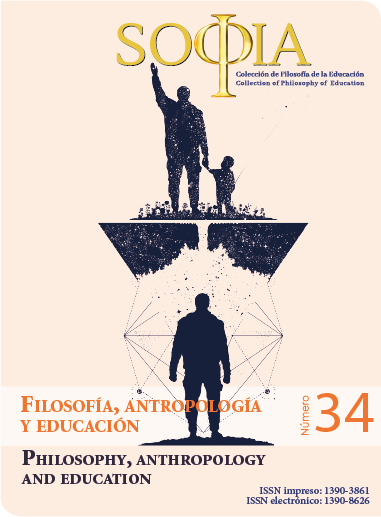Philosophical approach to paidocentric pedagogy
Main Article Content
Abstract
Article Details

This work is licensed under a Creative Commons Attribution-NonCommercial-ShareAlike 4.0 International License.
Authorship: The list of authors signing must include only those people who have contributed intellectually to the development of the work. Collaboration in the collection of data is not, by itself, a sufficient criterion of authorship. "Sophia" declines any responsibility for possible conflicts arising from the authorship of the works that are published.
Copyright: The Salesian Polytechnic University preserves the copyrights of the published articles, and favors and allows their reuse under the Creative Commons Attribution-NonCommercial-ShareAlike 3.0 Ecuador license. They may be copied, used, disseminated, transmitted and publicly displayed, provided that: i) the authorship and the original source of their publication (journal, editorial and work URL) are cited; (Ii) are not used for commercial purposes; Iii) mention the existence and specifications of this license.
References
ARISTÓTELES.
Moral, a Nicómaco. Trad. de P. Azcárate. Madrid: Espasa-Calpe.
Política. Trad. de M. García Valdés. Madrid: Gredos.
Metafísica. Ed. trilingüe de V. García Yebra. Madrid: Gredos.
DESCARTES, René
Reglas para la dirección del espíritu. Trad. de M. Machado. México: Porrúa, 1981.
DEWEY, John
Mi credo pedagógico. Trad. de F. Beltrán. León: Universidad de León, 1997.
Democracia y educación. Una introducción a la filosofía de la educación. Trad. de L. Luzuriaga. Madrid: Morata, 1998.
Las fuentes de la ciencia de la educación. Trad. de A. Oya. Girona: Palamedes, 2015.
FREIRE, Paulo
La educación como práctica de la libertad. Trad. de L. Ronzoni. Madrid: Siglo XXI, 1989.
Pedagogía del oprimido. Trad. de J. Mellado. Madrid: Siglo XXI, 1992.
FULLAT, Octavio
Filosofía de la educación. Madrid: Síntesis.
GADAMER, Hans-Georg
Verdad y Método. Fundamentos de una hermenéutica filosófica. Trad. de A. Agud y R. de Agapito. Salamanca: Sígueme, 1977.
La educación es educarse. Trad. de F. Pereña. Barcelona: Paidós.
GILSON, Étienne
El amor a la sabiduría. Trad. de R. T. Caldera. Madrid: Rialp, 2015.
GIMENO SACRISTÁN, José
“Tecnología y educación ¿Qué hay de nuevo?”. En: G. Hoyos Vásquez (ed.), Filosofía de la educación. Madrid: Trotta, pp. 129-156.
HEIDEGGER, Martin
La autoafirmación de la universidad alemana. Trad. de R. Rodríguez. Madrid: Tecnos, 1996.
Introducción a la metafísica. Trad. de Á. Ackermann. Barcelona: Gedisa, 2001.
La pregunta por la cosa. Trad. de E. García y Z. Szankay. Barcelona: Orbis, 1985.
-52 ¿Qué significa pensar? Trad, de H. Kahnemann. Buenos Aires: Nova, 1964.
KANT, Immanuel
Pedagogía. Trad. de L Luzuriaga y J. L. Pascual. Madrid: Akal, 1983.
-87 Crítica de la razón pura. Trad. de P. Ribas. Madrid: Alfaguara, 1983.
LESSING, Gotthold Ephraim
“La educación del género humano”, Escritos filosóficos y teológicos. Trad. de A. Andreu, Madrid: Editora Nacional, 1982.
MARCUSE, Herbert
El hombre unidimensional. Trad. de A. Elorza. Barcelona: Planeta-Agostini, 1993.
MÈLICH, Joan-Carles
Filosofía de la finitud. Barcelona: Herder.
MONTAIGNE, Michel de
“De la educación de los niños”, Ensayos I. Trad. de J. G. de Luaces. Barcelona: Orbis, 1984.
ORTEGA Y GASSET, José
Meditaciones del Quijote. Obras completas, t. 1. Madrid: Alianza-Revista de Occidente, 1983.
El tema de nuestro tiempo. Obras Completas, t. III.
Misión de la Universidad. Obras Completas, t. IV.
“Sobre el estudiar y el estudiante”. Obras Completas, t. IV.
PÉREZ-LUNA, Enrique
La pedagogía que vendrá: más allá de la cultura escolar positivista. Utopía y praxis latinoamericana, 23, 87-95. https://produccioncientificaluz.org/index.php/utopia/article/view/2654
ROUSSEAU, Jean-Jacques
Emilio o de la educación. Trad. de M. Armiño. Madrid: Alianza, 1998.
RUSSELL, Bertrand
Ensayos sobre educación. Trad. de J. Huici. Madrid: Espasa-Calpe, 1974.
SÁENZ-OBREGÓN, Javier
“La filosofía como pedagogía”. En: G. Hoyos Vásquez (ed.), Filosofía de la educación. Madrid: Trotta, pp. 157-177.
SANTOS GÓMEZ, Marcos
La educación como búsqueda. Filosofía y pedagogía. Madrid: Biblioteca Nueva.
SCHOPENHAUER, Arthur
Parerga y paralipómena, t. II. Trad. de P. López de Santa María. Madrid: Trotta, 2013.
SPRING, Joel
Introducción a la educación radical. Trad. de F. Velasco. Madrid: Akal.
TUBBS, Nigel
Philosophy’s Higher Education. Dordrecht: Kluwer.
UNAMUNO, Miguel de
De la enseñanza superior en España. Obras Completas, t. VIII. Madrid: Fundación José Antonio de Castro, 2007.
Del sentimiento trágico de la vida. Madrid: Espasa-Calpe, 1980.

